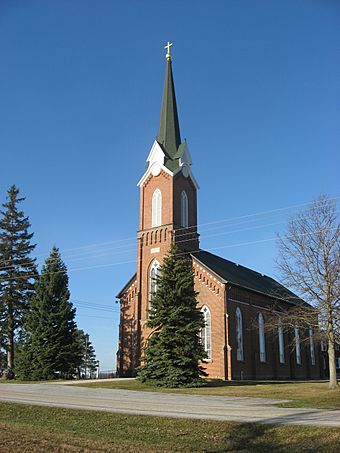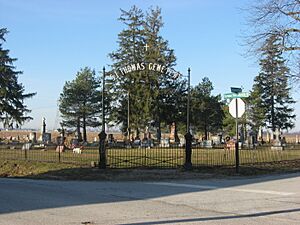St. Patrick's Catholic Church (Glynwood, Ohio) facts for kids
Quick facts for kids |
|
|
Glynnwood Catholic Church
|
|

Front of St. Patrick's Church
|
|
| Location | 6 miles northeast of St. Marys on Glynwood Rd., Glynwood, Ohio |
|---|---|
| Area | 1 acre (0.40 ha) |
| Built | 1883 |
| Architectural style | Gothic Revival |
| MPS | Cross-Tipped Churches of Ohio TR |
| NRHP reference No. | 79003454 |
| Added to NRHP | July 26, 1979 |
St. Patrick's Church is a beautiful old Catholic church located in Glynwood, Ohio. Glynwood is a small community in Auglaize County. This church was built in 1883. It features a special design style called Gothic Revival. St. Patrick's is part of a group of large Catholic churches in western Ohio. This area is often called the "Land of the Cross-Tipped Churches". Many Catholic families from other countries settled here in the 1800s. The church is found north of U.S. Route 33, between the towns of St. Marys and Wapakoneta.
How the Church Started
The church community, also known as a parish, began in 1857. It was first called St. Thomas' Church. It was located in a community known as Six Mile. Most Catholic churches in this area were started by German immigrants. However, St. Thomas' Church was founded by Irish settlers.
At first, church services were held in people's homes. Then, a kind member of the community gave land for a cemetery and a church building. The first church was built in 1860. Priests from the Society of the Precious Blood served the church. These priests were based in Minster, about 15 miles to the south.
Growing and Changing
In the 1870s, the community of Six Mile grew. This was because oil and natural gas were found nearby. Also, the Lake Erie and Western Railroad built a depot in Six Mile. The railroad renamed the community Glynwood, after a local resident named John Glynn.
St. Thomas' Church also grew a lot. The original wooden church became too small for all the people attending. So, in 1883, work began on a new brick church. In the same year, the church was renamed St. Patrick's. This was to honor Saint Patrick, who is the patron saint of Ireland. The cemetery, however, kept its original name, St. Thomas Cemetery.
Church Design and History
Experts who study old buildings have grouped the churches in western Ohio into different "generations." The first churches were usually small and made of wood. Not many of these early buildings are still standing today.
The second group of churches were generally small brick buildings. They did not have tall spires. St. Patrick's Church is special because it shows a mix of styles. It is a small brick building that replaced an older wooden church. But its tower looks like the taller, more detailed towers of the third generation of churches. These later churches are known as High Gothic Revival style.
Modern Times
In 1979, St. Patrick's Church was added to the National Register of Historic Places. This means it is recognized as an important historical building. Twenty-seven other churches in the area were added to the Register at the same time. This included the very first church in Minster, which was like a "mother church" to many others.
Today, St. Patrick's is still a busy church. It is part of the Archdiocese of Cincinnati. It works closely with Holy Rosary parish in St. Marys. Both churches are part of the St. Marys Deanery.
 | Percy Lavon Julian |
 | Katherine Johnson |
 | George Washington Carver |
 | Annie Easley |




